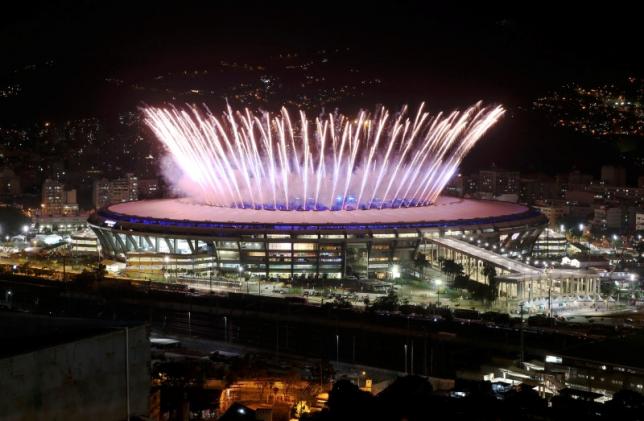
The 2016 Olympics have been formally opened with a colourful and pulsating ceremony at Rio’s Maracana stadium. Broadcast to an estimated audience of three billion, it celebrated Brazil’s history, culture and natural beauty, before former marathon runner Vanderlei de Lima lit the Olympic cauldron. Wimbledon champion Andy Murray led the Great Britain team into the arena. The build-up to Rio 2016 has been played out against a deep recession and political protests in Brazil. The Games, the first to be held in South America, have also been disrupted by concerns over the Russian doping scandal, the Zika virus and problems with the city’s security, infrastructure and venues. But organisers will hope the focus can now shift to the action in 28 sports, with 207 teams, after the Games of the 31st Olympiad were officially opened. The cauldron was lit by De Lima, who won bronze for Brazil in the marathon at the 2004 Games after he was grappled by a spectator while leading the race. Football legend Pele had ruled himself out of performing the role saying he was not in the right “physical condition”. With Brazil’s economy struggling, the budget for the opening ceremony was thought to be considerably less than the £30m spent at London 2012. And while Rio’s event did not match the enormous ambition of the ceremony directed by Danny Boyle four years ago, those inside the Maracana were treated to a show that mixed light displays, fireworks, dancing and music. After a simple but emotional rendition of the Brazilian national anthem, sung and played on acoustic guitar by singer-songwriter Paulinho da Viola, video projections beamed on to the floor of the stadium explored the history of the country. Starting with images of micro-organisms dividing – representing the beginning of life – the ceremony highlighted the contributions made by the nation’s indigenous peoples, by Portuguese explorers, by African slaves and by Japanese immigrants to Brazil’s history and culture. Performers jumped and danced across projections of giant buildings, symbolising the cities of Brazil, while a recreation of a 14-bis biplane – the invention of Brazilian Alberto Santos-Dumont – drew one of the biggest cheers of the evening as it flew out of the arena. Two-time Wimbledon champion and London 2012 gold medallist Murray said carrying the British flag into the Maracana would be the proudest moment of his career. The 29-year-old was followed by around 70 of Team GB’s 366 athletes, with many remaining in the training base in Belo. The Russian team, cut down to 271 athletes from an initial 389 following accusations of widespread doping, were at least spared any obvious negative reaction from the crowd. One of the warmest welcomes of the evening was given to a team consisting of refugee athletes. They were the penultimate group to enter the stadium. International Olympic Committee president Thomas Bach said the refugee team were sending “a message of hope to the millions of refugees around the globe”. The local crowd of 60,000 exploded with noise when the Brazil team, with London 2012 modern pentathlon bronze medallist Yane Marques flying the nation’s flag, emerged into the stadium last of all, to chants of “Brazil, Brazil, Brazil”. Team GB’s men’s cyclists will hope to claim Britain’s first medal of the Games when they compete in the road race, which starts at 13:30 BST next to Copacabana beach and will take in numerous climbs along its 237.5km route. Froome, who won the third Tour de France title last month, is expected to be GB’s medal hope, although the London 2012 time trial bronze medallist has said team-mate Steve Cummings is capable of winning the event. Swimmer Peaty will be the favourite to take gold in the 100m breaststroke, while Guy and Miley have hopes of winning medals in the 400m freestyle and 400m individual medley respectively. –BBC Online

